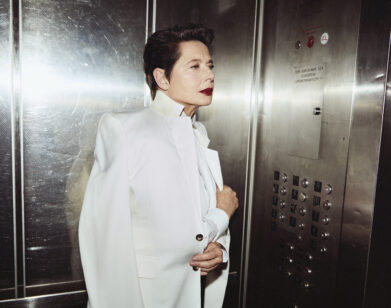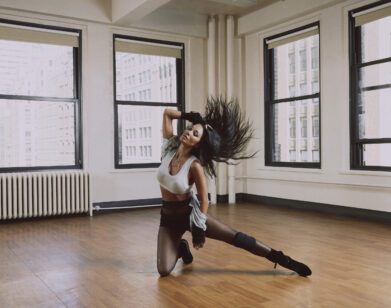Vanessa Redgrave
I discovered a long time ago that the camera does lie, and thank god it does. Vanessa Redgrave
How ought we address Vanessa Redgrave? She’s inarguably the crown princess of one of acting’s royal families (her father, Sir Michael, and her mother, Rachel Kempson, were titans of the British screen and stage), and she’s the informal grande dame of the English theater (she reportedly turned down damehood in 1999). But who else has won every award—Oscar, Tony, and Emmy—and had to compete with her own sister for an Academy Award for Best Actress, as Redgrave did against her sister Lynn in 1967? Who else has played so significant a role in many of film’s great movements—from the British 1960s new wave, of which her former husband Tony Richardson was the grand practitioner, to the existential modernism of Michelangelo Antonioni, who directed her in Blow-Up (1966), and on to the avant-garde, starring in Ken Russell’s anarchic Catholic drama The Devils (1971). All that, and in 2004 the onetime member of the Trotskyist Workers Revolutionary Party and outspoken critic of the Iraq War even managed to start a political party in England focusing primarily on human rights.
Other extraordinary Redgrave roles include: Anne Boleyn in A Man for All Seasons (1966); the titular Julia (1977); her appearances in the Merchant-Ivory films Howards End (1992) and The White Countess (2005); and her starring turns in Mary, Queen of Scots (1971) and Mrs. Dalloway (1997). In 2007 she portrayed Joan Didion in the Broadway rendition of The Year of Magical Thinking and recently reprised the author’s voice for a New York reading of Blue Nights. The 78-year-old Redgrave’s astonishing catalog is an ongoing hit parade. Even among the most glittering cast ever assembled, in 1974’s adaptation of Agatha Christie’s Murder on the Orient Express, Redgrave shines the brightest.
Considering her regal presence on the boards and in cinema, and her growing legacy (her children, including the late Natasha Richardson, continue in the family business), maybe we ought to just call her Your Majesty and leave it at that.
The Tony- and Pulitzer Prize-nominated playwright Martin Sherman has seen the grand dame at work, and still he is awed by her astonishing performances. This past November, after watching her latest turn, in Bennett Miller’s dark drama Foxcatcher, in which she plays the wealthy mother of ammunitions heir John du Pont, Sherman called Redgrave at her home in London to ask her how it’s done.
VANESSA REDGRAVE: Hello, my dear! How are you? I hear that the clever little bunny rabbits in London sent you a link that didn’t allow you to see the film.
MARTIN SHERMAN: Yeah, well, written smack across the center of the screen was “Property of Entertainment One,” with my name underneath. And, frankly, seeing my name sitting squarely between Channing Tatum’s nipples produced too many conflicting emotions. [Redgrave laughs] But I did look at your scenes, and even though I couldn’t really see the film, it was obvious it was wonderful. [laughs] I can’t wait to actually see it.
REDGRAVE: If I get a screener, let’s watch it together. It’s an absolute masterpiece of filmmaking. I haven’t seen a film of this depth—in cinema terms or in philosophical terms—since I can remember. I don’t know how I can approach the subject, except to say that it is a terrible tragedy approached in such a way that you really get a chance to think about just what was going on, and think about it for yourself. It doesn’t really set out to blast you with “This is a story.” Genius that he is, Bennett Miller doesn’t do that. I know comparisons are odious, as some Shakespearean character said, but his approach is more in the area of Antonioni. You’re not told what to think. In fact, every care has been taken to not put the film into various categories. The acting is superlative—Steve Carell, Channing Tatum, Mark Ruffalo. It’s not acting; it’s just being within the terms and context of Bennett Miller’s approach to cinema, and this film and this subject.
SHERMAN: I’ve always been really curious about how you make the switch between stage and film, because I know what your rehearsal process is in the theater; it’s quite extraordinary. Sometimes you come in with an aspect of the character and you play that fully. And the next day you come in with another aspect and you play that. And at the end of several weeks, you begin slowly and imperceptibly to discard and emerge, and the character comes out of that. But in a film, you usually don’t have a rehearsal, and you have to walk on the set, and whatever you do on the first day is what you’re stuck with, in a way.
REDGRAVE: Well, once in a blue moon, you get, like I had, the deep pleasure of working with people … I remember with Antonioni, he orchestrated and spelled out what he wanted in everything—makeup, hair, clothes, colors, spaces, how you sat, the spaces around you and behind you. In film, you can’t separate those elements from the development of the story or from the characters. In my case, I just delivered myself into the hands of Bennett Miller, and I know the other actors felt the same as I did, although they had a lot more work to do, in terms of wrestling as if they’ve wrestled all their lives, wrestling as brothers, which is a different thing from wrestling as competitors.
SHERMAN: In your scenes with Steve Carell, there was an incredible relationship that was so elusive and yet at the same time explained why this man had become who he had become. It was an amazingly rich and complex relationship in just a few scenes. How do you manage to find something so rich in a film where you’re only there for a short time?
REDGRAVE: Well, in this particular case, we didn’t really rehearse—just a couple little run—throughs, and then we shot. I don’t remember how many takes we did. Not that many. But I couldn’t articulate the essence of the relationship to myself, and it’s a good thing I couldn’t, because I was trying to be a transmitter, as it were, of what Bennett Miller was after. And having seen the film now, the essence of that relationship is that it doesn’t exist. [Sherman laughs] How do you portray that?
SHERMAN: The two of you, in a sense, have been strangers to each other and haven’t had a four-week rehearsal period.
REDGRAVE: Absolutely. Which is where film can capture what it’s very hard to capture in the theater. I guess we all strive, and if we have a director who can give certain guidelines, we can get somewhere near that. But one of the joys of cinema is that, given the right circumstances, and the genius director, an incredibly wonderfully actor can become the embodiment of his character. As far as I was concerned, he wasn’t Steve Carell; he was this unusual man who seemed to be my son. And he was my son, but that’s all the lady could possibly understand of him. It’s so different from the theater. By the way, when was the film of your wonderful play Bent made?
SHERMAN: Oh, I’m so bad with years. But it was in the later ’90s, long after the play was first done. Sean Mathias directed it brilliantly.
REDGRAVE: I saw the play but I didn’t see the film. I don’t know why. It’s apropos of what you’re saying about theater and about film.
SHERMAN: It’s the same thing with writing. It’s completely different. But the differences are, in a way, easier to define with writing. The joy of writing a play is that you can talk. And the joy of writing a film is that you don’t talk.
REDGRAVE: Yes, indeed. That was really one of the qualities of my part in Foxcatcher—my character has very little dialogue.
SHERMAN: I noticed it was an extraordinary script, so spare.
REDGRAVE: What a script says that isn’t dialogue is as important as the spoken word. I remember when Jane Fonda and I were doing the café scene in Julia, the night before we shot, [director] Fred Zinnemann said that he wanted us both to work on the scene to cut our own dialogue as much as possible—which we did. I thought, “My God, this is brilliant.” You, as a writer, will understand that. Some things will go, but on the other hand, if the director can communicate on film, things can be communicated that didn’t need to be communicated in word. And, of course, we were not taking out each other’s lines; we were taking out our own lines, anything that we considered superfluous.
SHERMAN: It’d be funny if you would cut out each other’s lines. [laughs]
REDGRAVE: It would be absurd, wouldn’t it?
SHERMAN: I had a conference call once with a producer, for a project that Sigourney Weaver was proposing to be in. And the executives kept wanting me to add things to the script. And often when you deal with idiocy, you’re doing it yourself; you can blame yourself and think, “Well, maybe I’m the idiot.” But when you hear somebody else deal with it, everything comes into focus. And at one point, Sigourney interrupted and said, “No, no, no. Martin doesn’t have to put any of that into the script because, you see, it will all be there on my face. That’s what we do.” [both laugh]
REDGRAVE: Yes. But it never got made?
SHERMAN: No, of course it never got made. You mentioned Fred Zinnemann, and you’ve worked with extraordinary directors, but what happens when you work with an un-extraordinary director? What don’t you want a director to do?
REDGRAVE: Talk rubbish, basically. [laughs] I mean, forgive me, it’s so off-putting. When somebody can’t reveal what they’re after—whether by word or by how the camera is set up, lighting, etcetera—it’s like an electronic beep beep; it interferes very much with what we actors can do. And, after all, the director wants the actors to be bringing forth the best that they can, according to whatever vision he has. So it can be dispiriting to see there really is a rather limited vision. What’s exciting is when you don’t quite know but you sense, “Yes, the radar’s good, and for better or worse, we’re all on the same radar.”
SHERMAN: And then you step over entirely.
REDGRAVE: Well, we do anyway, because you can’t do what you’ve been asked to do unless you do the best you can. And roughly speaking, the best you can do is to be very available as a character and actor to the people you’re acting with. That’s equally important, whether the camera’s on the other person or on you.
One must never comment as an actor, never show that a character is shallow or vindictive, but let that be conveyed. I mean, none of us thinks of ourselves as being vindictive or shallow—perhaps we should.Vanessa Redgrave
SHERMAN: You’ve also been in the interesting position of being directed at different times by a husband and by a son.
REDGRAVE: I have. Working with Tony Richardson was terrific in my experience in The Charge of the Light Brigade [1968], although we did do a couple more films together. I think The Charge of the Light Brigade is a masterwork, as they say.
SHERMAN: Oh, it is.
REDGRAVE: And it remains so today, in a thousand ways. The lighting ran against everything that’s ever been done in cinematography—not balancing the light, for instance. [Cinematographer] David Watkin was brilliant. The makeup department—apart from the whiskers that they had to put on the gentleman, being as they were generals and field marshals and cabinet ministers—had to literally follow the women as if they were spying on them, because some of the actresses, having been told “no makeup,” took that to mean makeup that looks like no makeup. That was a kind of running battle, which intrigued me because, for what Tony wanted, it was essential that you get all the different skin tones, including, obviously, when it was indoors or outdoors. And it’s a wonder to see what happens when actually there is no makeup. If I see an actress playing a leading role, and she’s supposed to be out in the snow, on the battlefield, or whatever, and she clearly has makeup on, well, there goes that illusion. And there always comes a moment where all the departments in a film need to work together. And if a director, his first assistant director, and cinematographer have a very clear vision, then everybody does work together. So going back to Foxcatcher, the skin color of a guy who’s been indoors most of his life, and is not on a good diet—sort of pasty skin color—that reads enormously. Whether anyone picks it up or not doesn’t matter. It’s there.
SHERMAN: Steve Carell is physically amazing. I’ve heard that a couple of critics were snarky about his nose, which is absolutely ridiculous. That’s a brilliant piece of makeup. And it’s arranging the face for artistic purposes. As opposed to a lot of nonartistic rearranging of faces that you see on film. I was thinking about something with The Charge of the Light Brigade. When I was very young, I was in the playwright’s unit of the Actor’s Studio, and Al Pacino was in the actor’s unit. One day I asked him what screen performance had he seen relatively recently that he most admired. I was sure he was going to choose something by Brando or somebody like that. And he said John Gielgud in The Charge of the Light Brigade.
REDGRAVE: Oh, that thrills me. Well, he is a super-intelligent guy, Al. That’s wonderful to hear.
SHERMAN: I used to watch Lee Strasberg in classes. And he had many brilliant things to say, and obviously there were people like Pacino who understood him completely, but there were also an enormous amount of people who didn’t understand what he was saying, and misused what he said. I very often have thought that the best method actress I’ve ever seen is you.
REDGRAVE: What? Really?
SHERMAN: You seem to personify many of the things that he talked about in terms of living in the moment.
REDGRAVE: Well, that’s a total must. It can be done with encouragement from the director and cinematographer and camera operator. I mean, I’ve had occasions when I’ve been working and I knew the camera setup wasn’t going to convey what I was doing. And that’s difficult, because even if one’s right, as an actor … Tony said to me long ago, before I did a film directed by the wonderful Karel Reisz, Morgan! [1966], “Listen, it’s the director’s film.” And he was telling me this because I had been basically a theater actress. He said, “You could be right about what you say, but it’s the director’s vision, and if you interfere with that, it will be nobody’s vision. It will get mixed up.” I’ve tried hard to follow that advice; it’s very important advice. In the case of Carlo Nero, my son, I think the world of him, because he thinks a lot. When we’ve worked together, particularly on the HBO film The Fever [2007], it was wonderful. In a lot of The Fever, the lady I was playing talks to the camera. And Wally Shawn and Carlo had adapted a terrific script from Wally’s play, and talking to the camera conveyed an enormous amount of the story. I fell into the trap of making a comment about the woman herself in my acting of the narrative exposition to the audience, and we rectified it as much as we could along the way, because, as an actor, you have to not comment. The director can, if that’s his choice, in how he develops the whole story and the whole film. But one must never comment as an actor, never show that a character is shallow or vindictive, but let that be conveyed. I mean, none of us thinks of ourselves as being vindictive or shallow—perhaps we should. If we’re lucky, somebody tells us. Incidentally, I discovered a long time ago that the camera does lie, and thank God it does. Karel and I did another film, Isadora [1968], and I was going to be doing a scene in which Isadora Duncan was in full flow—happy, seductive, or thinking she was seductive—with [Paris] Singer, the multimillionaire, played by Jason Robards. I was so terrified. I thought it was going to be a day that would have to be scrapped because I was so nervous and so frightened, and so not like what Karel wanted in the scene and what the scene was written to be. I don’t watch rushes, except to see how the lighting and makeup are reading. But I asked Karel if I could just see that scene. And he said, “Yes, absolutely.” I looked at it, and I couldn’t detect a sign of fear. I’d been ready to throw up, I was so frightened. So the camera does lie, and acting can sometimes deliver. [laughs]
SHERMAN: Maybe the camera was seeing a deeper truth.
REDGRAVE: That’s how it happens. And that’s one of the many wonders …
SHERMAN: It doesn’t lie. Or it doesn’t lie in ways that are not obvious. It goes underneath and gets the real truth.
REDGRAVE: And that real truth can be more surprising than even the director imagined it could be. That’s a wonderful thing that grows and happens.
SHERMAN: You can see it in your scenes with Steve Carell in Foxcatcher. You see so much in when you’re watching the wrestling. It isn’t just disapproval; it’s a special kind of disapproval.
REDGRAVE: Explain.
SHERMAN: It’s hard to. It’s disapproval of what your son is doing, but not in any of the clichéd ways. A lot of it has to do with class.
REDGRAVE: A lot.
SHERMAN: I grew up in New Jersey—of course, New Jersey’s very close to Delaware—and du Pont was such a prominent name as I was growing up, such a prominent family. It was amazing to enter into their lives. It was a family, in my youth, as prominent as the Rockefellers. Secretive, elusive, but legendary.
REDGRAVE: Recluses, but at the same time being meshed into the courts, the legislature, the trades, the commerce, the banks. I think it’s wonderful that we understand and begin to take that on board when John du Pont in the film is having target practice, using the gunpowder that first made them their money.
SHERMAN: Near Valley Forge, which is really where the founding of the country takes place.
REDGRAVE: There’s a lot of talk these days of dark money in the financial press. Bennett has revealed them as only one of the qualities in the film: Dark money deforms human beings, fostering urges of violence and jealousy. But the great thing is the film doesn’t spell it all out. We get what we get, what we’re each capable of getting. I remember asking the wonderful stage and film designer Jocelyn Herbert about a picture that she had in her studio by a famous American contemporary artist, which was basically bands of different colors following one another. I said, “Jocelyn, what am I supposed to think?” Which is very much how our education tells us we are supposed to think—write down the right answer and you’ll get a proper grade. And she said, “You’re not supposed to think anything; you get from it what you get.” An awful lot of filmmaking and playmaking is taken over by marketers and publicists, who set about to tell people what to think. And people feel safer that way. But it’s not safe, and the whole wonderful thing that cinema and filmmakers can contribute is to go into the not-safe land of real life.
SHERMAN: That’s true of any artistic endeavor. And it is also true that we are taught in advance what that piece of art is. I am rarely able to have a pure experience, certainly with film, starting with trailers.
REDGRAVE: Indeed! One member of my family has deliberately tried to not see anything to do with Foxcatcher, wanting to take the film in the purest way possible, i.e., not having images and descriptions muddling around in the brain. It’s very hard to escape that.
SHERMAN: So in order to attract people to the film, you actually have to somewhat diminish the experience. Are you and Carlo going to make another film?
REDGRAVE: Definitely. Carlo and I have a little film company, and we’re very happily settled at Twickenham Studios, which is where Michael, my dad, did his film The Stars Look Down [1939], which is about the miners. We just made another small documentary, Bosnia Rising. We’re going to have a private screening in a few days, and I would love to show it to you and see what you think. And this time, I promise, it won’t be covered by your name or anybody else’s.
MARTIN SHERMAN IS AN AMERICAN PLAYWRIGHT AND SCREENWRITER. HE IS BASED IN LONDON.







